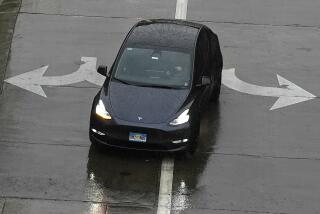Don’t Blame GM for Electric Car’s Demise
Regarding “Movie Casts the Electric Car as Hero, GM as Bad Guy,” July 15:
Your story -- like the film “Who Killed the Electric Car?” -- perpetuates several myths.
It is a myth that electric cars do not pollute; the pollution is simply transferred from the tailpipe to the generating plant.
It is a myth that electric cars reduce our dependence on fossil fuels; except for nuclear and hydroelectric power, generating plants burn fossil fuels or coal.
Not even mentioned are the environmental issues with recycling the batteries when they wear out, who would pay for replacement batteries and so forth.
The biggest myth is that there was great demand for electric cars. As I learned in economics class, demand is not simply wanting something -- demand is wanting something and having the money to buy it.
The fact is that each EV1 cost GM about $150,000 to make. That is the reason the automaker did not sell the cars but leased them for about $500 a month, which included all maintenance. (Parts were not available at Pep Boys.)
You could never lease a $150,000 car for $500 a month on the open market. GM was subsidizing EV1 drivers -- no wonder they liked it.
The bottom line is that electric car technology was not ready and was replaced by hybrid technology.
Andrius V. Varnas
Redondo Beach
*
Who killed the electric car? The oil industry, which did not want a competing source of fuel.
The EV1 was produced in response to a mandate to develop zero-emission vehicles, and it succeeded. But the electric car’s great significance was that it used no gasoline and was a true alternative and threat to the oil industry.
The electricity to fuel such a car can come from any source -- for example, solar. The hybrid, though more fuel efficient and less polluting, is still a gasoline-consuming vehicle.
This explains the conspiracy to kill the electric car. The consumers are not to blame. They were the targets of a massive oil industry disinformation campaign.
Constance Chesnut
Santa Monica
More to Read
Inside the business of entertainment
The Wide Shot brings you news, analysis and insights on everything from streaming wars to production — and what it all means for the future.
You may occasionally receive promotional content from the Los Angeles Times.










